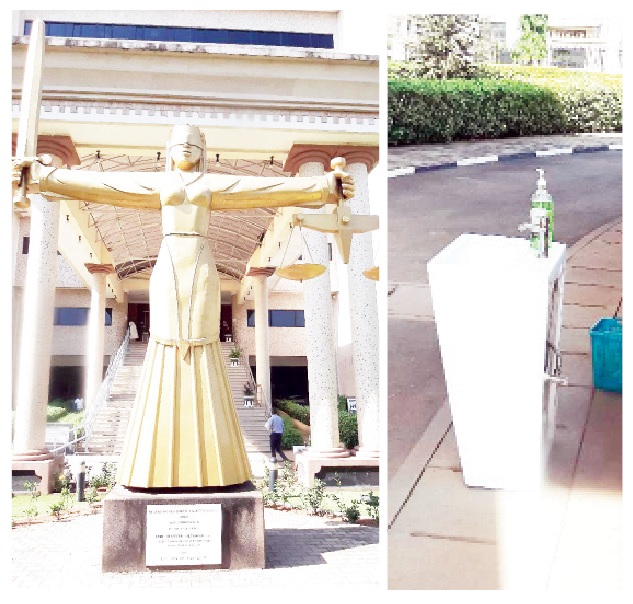The COVID-19 global pandemic, which eased a bit in the middle of 2020, relapsed to the second wave in the latter part of the year and there are predictions the casualty figures will surge in the first quarter of the year 2021.
In the judiciary, the ease of lockdowns and resumption of activities have also seen some relaxation of the earlier adopted measures during this second wave.
- ‘COVID-19 first wave prepared us for second wave’
- COVID-19: Public, private schools in Lagos to resume January 18
The pandemic hit Nigeria in March 2020 forcing economic lockdowns for almost three months. Since then, 90, 000 cases have been reported, 75, 044 have recovered while 1, 311 have died as of January 3. Lagos, FCT and Plateau States lead the infection figures in the country.
There have been 84, 382, 669 infections globally with a total of 1, 805, 417 deaths as of January 2. The three leading figures in the world are US -20, 636, 663 cases with 351, 580 deaths; UK- 2, 654,779 with 75, 024 deaths and Brazil 7, 733, 746 cases with 196, 018 deaths.
Despite reported cases of some more rapidly transmissible variants across the globe under the second wave, it has been observed that public places, including the courts in Nigeria, have reduced compliance with the health protocols, which were earlier enforced under the first wave. Although courts have wash handstands, many court users do not feel compelled to use them. Also, there is a reduction in the use of hand sanitisers, face masks, temperature checks and social distancing.
This current apathy, which experts have blamed on protocol fatique, contrasts with the earlier measures put in place in courts nationwide between March and June to support the government’s stringent efforts to flatten the curve of infections. Among the measures by some heads of courts nationwide was the formulation of the COVID-19 Practice Direction.
Further, the National Judicial Council (NJC) in their meeting of May 7 directed the use of face masks, social distancing measures and temperature tests at court premises.
The council also expressed its determination to implement the use of Information and Communications Technology (ICT) in court proceedings not only to address the need to create less physical attendance in courts during the COVID-19 period but also to expedite dispensation of justice in the country going forward.
The Chief Justice of Nigeria, Justice Tanko Muhammad said the council approved virtual sittings for all heads of courts using collaborative platforms such as MS365, Zoom, Google Meetings and other tools with electronic recording functionalities.
In the guideline titled: ‘National Judicial Council COVID-19 Policy Report: Guidelines for Court Sittings and Related Matters In the COVID-19 Period’, the NJC also said social media channels shall be used to live stream court proceedings to the public while the court shall publish on a weekly basis the matters that would be heard remotely for that week.
“Physical sittings by courts in courtrooms should be avoided as much as possible during this COVID-19 period. Such physical court sittings must be limited only to time-bound, extremely urgent and essential matters that may not be heard by the court remotely or virtually,” he said.
Some judicial officers were said to have died from COVID-19 related complications in 2020. Also, the CJN Tanko Muhammad in December denied rumours that he was flown to the UAE on a COVID-related ailment. In July, the Chief Judge of the Federal High Court, John Tsoho and members of his immediate family and close aides, were forced to self-isolate following a confirmed case of COVID -19 among his official aides.
From the experience, Justice Tsoho in an end of the year message to the staff of the court on December 15, 2020, cautioned that the pandemic is still around, while assuring that the court is not overwhelmed by the challenge.
“I feel compelled to state that as far as the pandemic is concerned, we are not out of the woods yet. It is for that reason that I urge caution. Let us continue to maintain permissible social distancing and necessary measures for the prevention of the spread of COVID-19,” he said.
Also speaking with Daily Trust, the Director of Information of the Supreme Court, Dr Festus Akande said the measures already put in place by the apex court remain in place.
“We can’t relax the measures now; we have to still maintain them. Even if they tell us that COVID-19 is over, we still have to maintain them for some time. So, all measures that remain in place have to be measured,” he said.
Reacting, a Senior Advocate of Nigeria, Dayo Akinlaja called for rigorous enforcement of the COVID-19 pandemic as a way of preventing the spread.
“That is the clarion dictate of the time and season we are in. The pandemic is very much around and sufficiently lethal. It is sheer foolishness if not suicide for anyone to ignore the protocols. More and more people are being lost to the pandemic and it is only wise for everyone to be more vigilant and careful,” he said.
Sunusi Musa Esq commended the Supreme Court for maintaining the protocol put in place during the first wave of the pandemic, adding that virtual hearings will be better.
Former Secretary of the Nigerian Bar Association (NBA), Abuja branch, Noah Ajare said of all the courts he had been to in Abuja, only the Federal High Court, Court of Appeal and the Supreme Court still maintain reasonable compliance with the protocols.
“In most courts, there are no wash handstands, sanitisers, temperature checks and social distancing. The courts are not complying but COVID is real,” he said.

 Join Daily Trust WhatsApp Community For Quick Access To News and Happenings Around You.
Join Daily Trust WhatsApp Community For Quick Access To News and Happenings Around You.


